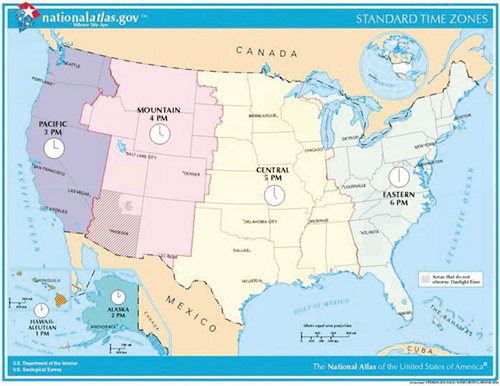
Senator Marco Rubio and other senators are leading a bipartisan effort to make DST permanent across the country.
Such a move would have a profound effect on when religious Jews can pray in the morning, as described below.
Do you support such a change?
On Nov. 18, 1883, the United States adopted four time zones. Until that point every city had its own local time zone based on when the sun was overhead at noon, but that system became untenable as trains had to set schedules incorporating hundreds of local time zones.
On Mar. 19, 1918, the United States copied Germany in moving to a daylight saving system by moving the clocks forward an hour in the summer and backward in the fall. It was not used in all places at all times and didn’t become the federal standard until 1967.
Currently, 48 states go through the rigmarole of changing the clocks twice a year. Arizona and Hawaii use standard time year-round.
As a parent, I despise changing the clocks. When we “fall backward” the kids wake up an hour earlier and when we “spring forward” the kids won’t fall asleep on time and have trouble waking up on time for the bus to school.
But should the system be fixed?
Dozens of states have proposals to change to year-round daylight saving time or year-round standard time.
California, Florida, Oregon and Washington are trying to move to year-round daylight saving time. However, the federal government currently only allows states to have year-round standard time, not year-round daylight saving time.
Kansas, Oklahoma and Texas are trying to move to year-round standard time.
Connecticut, Massachusetts, Maine, New Hampshire and Rhode Island want to move from the Eastern time zone to the Atlantic time zone, which is one hour ahead. They also want to move to year-round standard time. That move would effectively give them year-round daylight saving time compared to what they have now.
Marco Rubio and Vern Buchanan introduced bills into the Senate and the House to move the entire country to year-round daylight saving time.
Among other issues, permanent daylight saving time would mean that my own kids would be waiting for the bus in the pitch black during the winter months, creating a potentially dangerous situation. The National PTA is opposed to daylight saving time during the winter months for that reason.
For example:
In New York City sunrise on January 5 would go from 7:20 a.m. to 8:20 a.m.
In Cleveland sunrise on January 5 would go from 7:53 a.m. to 8:53 a.m.
In Detroit sunrise on January 5 would go from 8:01a.m. to 9:01 a.m.
However, permanent daylight saving time would also mean that there is less crime, which typically takes place after nightfall.
Many of the original reasons, such as energy savings, no longer apply today. What is known is that heart attacks and other health issues are more common after we “spring forward,” so there is solid logic to eliminating time changes.
Time changes also have some unique factors for religious Jews.
Permanent daylight saving time would mean the earliest time to daven the morning prayers would be quite late, which would cause serious problems for those who want to daven with a minyan and then go to work.
In New York City the earliest time to daven on January 5 would go from 6:26 a.m. to 7:26 a.m.
In Cleveland the earliest time to daven on January 5 would go from 6:58 a.m. to 7:58 a.m.
In Detroit the earliest time to daven on January 5 would go from 7:06 a.m. to 8:06 a.m.
But permanent daylight saving time would also mean not having to rush home as early on Fridays in December to make it on time for Shabbos, though it would also mean longer winter fast days.
In New York City the earliest time for sunset in December would go from 4:28 p.m. to 5:28 p.m.
In Cleveland the earliest time for sunset in December would go from 4:56 p.m. to 5:56 p.m.
In Detroit the earliest time for sunset in December would go from 5:00 p.m. to 6:00 p.m.
Permanent standard time robs people of long summer evenings, but on the other hand it would mean the end of the super late Friday night Shabbos dinner and long summer fast days.
In New York City the latest time for sunset in June would go from 8:31 p.m. to 7:31 p.m.
In Cleveland the latest time for sunset in June would go from 9:04 p.m. to
8:04 p.m.
In Detroit the latest time for sunset in June would go from 9:13 p.m. to 8:13 p.m.
That’s a whole lot to unpack and it also shows that there actually may be an advantage for religious Jews to the craziness of twice-yearly clock changes.
The Forward reports that Agudath Israel of Florida lobbied against Florida trying to adopt permanent daylight saving time. Florida wound up passing that bill, though they are still awaiting permission from the federal government to implement the change.
Besides, when will you change the batteries on your smoke alarm and check if you have any miles expiring if not for the time change?
There are certainly pros and cons for any of the options and we may well wind up with states that observe permanent standard time, states that observe permanent daylight saving time, and states that change the clocks twice a year.
Which side of the debate are you on? Would you spring forward and not fall back, fall back and not spring forward, or leave things the way they are?
By Dan Eleff/ www.DansDeals.com











